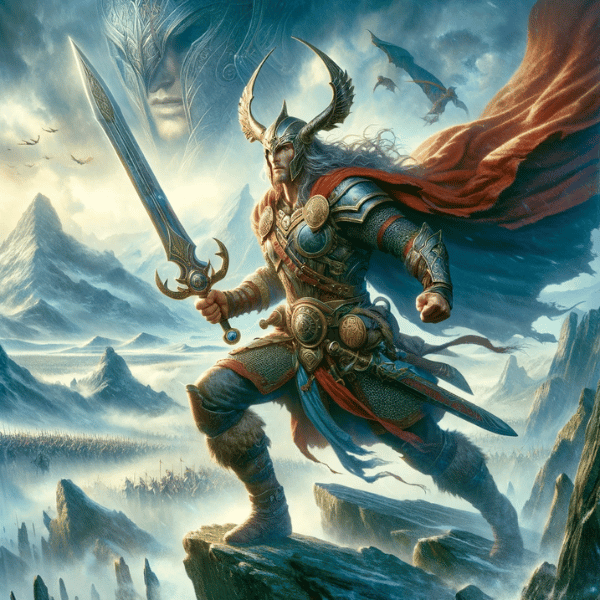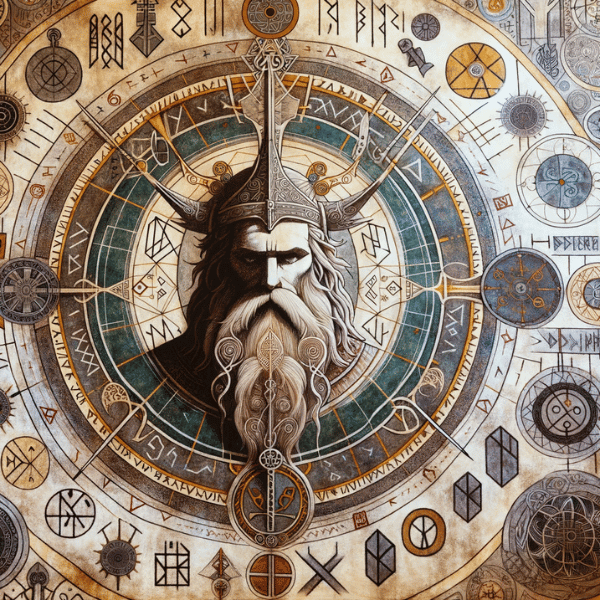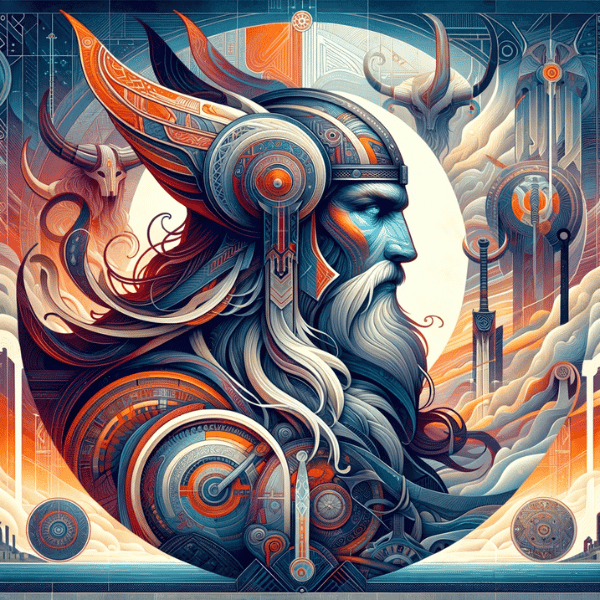Norse mythology, a bedrock of Scandinavian heritage, offers a rich tapestry of tales and characters that have profoundly influenced Western culture. Among these storied figures stands Volsung, a legendary hero or demigod whose saga intertwines with the fates of gods and mortals alike. Central to the Volsunga Saga, Volsung epitomizes the quintessential Norse virtues of bravery, honor, and destiny. His narrative, steeped in mythic grandeur, is not just a mere tale of adventure; it’s a cultural artifact that offers insights into the ancient Norse worldview and ethos. Volsung’s role in these legends extends beyond mere myth, reflecting the values and struggles of the society from which he emerged, making his story an indispensable part of understanding Norse cultural and historical legacy.
| Attribute | Völsung Information |
|---|---|
| Origin | Norse Mythology and Germanic Sagas |
| Heroic Figure | Legendary hero and patriarch of the Völsung clan |
| Sword Gram | Possessed the sword Gram (Balmung), a renowned weapon |
| Saga | Central figure in the Völsunga Saga, a significant Old Norse saga |
| Family Legacy | Father of Sigmund and Signy, with a heroic lineage |
| Cultural Impact | Revered as a symbol of heroism and noble lineage in Norse and Germanic tales |
| Depictions | Featured prominently in the Völsunga Saga, known for his heroic exploits |
1. The Mythological Roots of Volsung
Norse Mythology: Origins and Context
Norse mythology, originating from the ancient Germanic and Scandinavian regions, forms a fundamental aspect of pre-Christian culture in these areas. Chroniclers later documented these myths, rooted in oral traditions, in texts like the Poetic Edda and the Prose Edda, offering a glimpse into the ancient Norse world. This mythology features a pantheon of gods like Odin, Thor, and Freya, and an elaborate cosmology with realms like Asgard and Midgard. The myths were not just stories but were integral to the Norse understanding of the world, intertwining the mystical with the everyday life of the Vikings.

Volsung in the Norse Hierarchy
Within this rich mythological tapestry, Volsung holds a unique position. He is often depicted as a semi-divine figure, a hero born of noble lineage. According to the legends, Volsung is the son of Rerir, a descendant of Odin, thus linking him directly to the divine. His saga, therefore, is not just a tale of human endeavor but is elevated to a cosmic level, involving interactions with gods and other supernatural entities. This lineage places Volsung in a unique position in the Norse mythological hierarchy, bridging the world of gods and humans.
The Volsunga Saga and Beyond
The Volsunga Saga, an epic tale dating back to the late 13th century, but believed to be based on much older oral traditions, serves as the primary source for Volsung’s story. This saga chronicles the lineage of the Volsung family, detailing their heroic deeds, tragic destinies, and interactions with gods. Alongside the Volsunga Saga, other historical texts and inscriptions contribute to our understanding of Volsung’s story. These include references in the Poetic Edda and snippets in various sagas and historical chronicles, which collectively paint a comprehensive picture of this iconic Norse hero.
2. The Life and Deeds of Volsung
Birth and Lineage: Divine Connections
Volsung’s story begins with his extraordinary birth, rooted in the divine. As the son of Rerir, who himself was a descendant of the god Odin, Volsung was born into a lineage that blended the mortal with the celestial. This connection to the gods was not merely symbolic but an integral part of his identity, bestowing upon him qualities that surpassed ordinary human capabilities. This divine heritage set the stage for Volsung’s life, marking him as a figure of significant power and destiny from the outset.
A Saga of Heroism: Key Events in Volsung’s Life
Volsung’s life was marked by a series of remarkable events and adventures, each contributing to his legacy as a hero. Among these was the founding of a great hall by Odin himself, a testament to Volsung’s favored status among the gods. His leadership and bravery were exemplified in various battles and quests, where he displayed not just physical prowess but also the qualities of a just and wise ruler. His life was a tapestry of victories, challenges, and acts of heroism that echoed the very essence of Norse valor.

Central Role in the Volsunga Saga
In the Volsunga Saga, Volsung’s role is pivotal. He is portrayed as a paragon of the virtues admired by Norse society: courage, honor, and a strong sense of duty. His challenges were not merely physical but also moral and ethical, often involving complex interactions with gods and other legendary figures. His saga is rife with trials that test his character and resolve, from avenging family members to navigating the treacherous landscape of Norse politics and warfare. Volsung’s story, encapsulating both his triumphs and tribulations, is a compelling narrative that offers profound insights into the Norse conception of heroism and the human condition.
3. Symbolism and Significance of Volsung
Volsung as a Cultural Symbol
Volsung, more than a mythological character, stands as a symbol of various aspects of Norse culture. His story encapsulates the archetypal journey of a hero, embodying the Norse ideals of bravery, resilience, and honor. In a culture where the feats of warriors were highly esteemed, Volsung’s exploits and moral fortitude resonated deeply. He also represents the complex relationship between mortals and the divine in Norse mythology, where gods directly intervened in the lives of heroes. This connection symbolizes the Norse belief in destiny and the intertwining of the human and supernatural realms.

Impact on Norse Values and Ethics
Volsung’s saga significantly influenced Norse values and ethics. His character exemplified the virtues of loyalty, courage, and leadership, serving as a model for behavior in Norse society. His actions and decisions, often in the face of daunting challenges, reflect the moral compass of the Norse people. The saga, through Volsung’s life, also explores themes of family loyalty, revenge, and the pursuit of honor, all central to Norse ethical systems. His story thus served as a narrative framework for imparting societal norms and values.
Comparative Analysis with Other Mythological Heroes
Comparing Volsung with heroes from other mythologies reveals interesting parallels and contrasts. Like Greek heroes such as Achilles, Volsung is semi-divine and faces a destiny intertwined with gods. However, unlike the individualistic heroes of Greek mythology, Volsung’s actions are more closely tied to family and kinship, a reflection of the communal values in Norse culture. Similarly, when compared to epic heroes like King Arthur, Volsung’s narrative is less about chivalry and more about raw courage and the harsh realities of life. These comparisons not only highlight the uniqueness of Volsung but also illustrate the broader tapestry of heroism across different cultures.
4. Volsung in Modern Culture
Influence on Literature, Art, and Media
The legacy of Volsung extends far beyond the ancient texts, permeating modern literature, art, and media. His saga has inspired numerous works, ranging from operatic adaptations to contemporary fantasy literature. Richard Wagner’s renowned opera cycle, “Der Ring des Nibelungen,” for instance, draws heavily from the Volsunga Saga, showcasing Volsung’s enduring appeal. In modern literature, elements of his story can be seen in popular fantasy novels, where themes of heroism, destiny, and conflict with the divine echo Volsung’s saga. In the realm of visual arts, representations of Volsung and his adventures have been a recurring motif, capturing the imagination of artists for centuries. His influence can also be seen in modern media, including films and video games, where Norse mythology has seen a resurgence, often with Volsung’s story as a central theme.

The Continuing Legacy of Volsung Today
Today, Volsung’s legacy continues to resonate, illustrating the timeless nature of his story. His saga, with its deep-rooted themes of heroism, sacrifice, and the human-divine connection, continues to be relevant in exploring contemporary issues. The character of Volsung serves as a bridge connecting the ancient world with modern audiences, offering insights into universal human experiences. His enduring popularity underscores the fact that the themes and values represented in his story are not just relics of the past but continue to have significance and impact in the modern world. Volsung, therefore, remains a potent symbol, not just of Norse culture, but of the enduring power of myth to shape and reflect human societies across ages.
5. Conclusion
The saga of Volsung, a tapestry woven with heroism, divine interplay, and profound cultural symbolism, endures as a testament to the rich legacy of Norse mythology. His story transcends mere myth, offering a window into the values, beliefs, and societal dynamics of ancient Norse culture. Mythological heroes like Volsung are not just relics of a bygone era but are crucial in understanding the ethos of the civilizations they originate from. They serve as cultural anchors, connecting us to the past and offering timeless insights into human nature and societal ideals. Volsung’s enduring appeal in modern culture further underscores the universal relevance of such legendary figures, demonstrating their capacity to inspire, educate, and resonate across generations.
